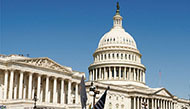▶ FRANK BRUNI
Tell that to Barack Obama as he waits this week to learn the fate of his landmark health care legislation, achieved through such fierce effort, meant to be a cornerstone of his legacy, and now utterly out of his hands.
Or as he watches the unfolding debt crisis in Europe, which could capsize the American economy between now and Election Day. He has minimal sway over how European leaders handle it. He has everything to lose if the job is botched.
Each month he braces for new Labor Department jobs numbers, knowing that his actions at this stage can’t influence them much before November and knowing, at the same time, that they could save or doom him.
On most fronts and in many ways, his presidency right now is an exercise in hoping and in holding his breath. He attained the most formidable station in the world only to experience a flimsy degree of control.
He’s hardly the first president to cross into this cruel limbo, where every hiccup in the domestic economy and spasm abroad is a potential death knell — or a mercy.
But how many presidents, at least in recent decades, have known something precisely like the Supreme Court’s possible erasure of the Affordable Care Act? How many have confronted a Congress this wholly paralyzed by partisan rancor and this steadfastly unyielding?
How many have done so after such an accelerated and charmed political prelude, during which they exerted such control over their own narratives?
While most politicians write their stories once they’ve laid some claim to the spotlight and are already operating in its skeptical glare, Obama did so years in advance, setting the stage long before he strode onto it. The first edition of “Dreams From My Father,” a framing device for the campaigns and speeches to come, was published in 1995. He wasn’t even an Illinois state senator yet.
It was an act of careful and considered self-definition, and with the publication of David Maraniss’s new biography of Obama earlier this month, we learned just how careful and considered. Obama tailored characters to suit his themes and invented a few details of his family’s past, saying that a step-grandfather was killed in combat against Dutch troops in Indonesia when he really, according to Maraniss, died in a fall from a chair as he hung drapes.
One of the most widely cited observations in Maraniss’s biography, “Barack Obama: The Story,” is that he had a “determination to avoid life’s traps.” He refused to let circumstances box him in; craved room to maneuver; kept his options open. In college he floated between cultures and political and social groups, studiously avoiding commitment. In the Illinois State Senate, he stood out in part for the frequency with which he voted “present” rather than yea or nay. He wouldn’t be pinned or pigeonholed.
And now? He’s beholden to lawmakers’ whims, buffeted by global winds, as much a spectator as an agent of the most important developments around him, a leader of the free world who follows the news like the rest of us. Against Obama’s wishes and will, his attorney general is investigated and excoriated by a House panel. His jobs bill languishes. Egypt charts a once unexpected course, electing an Islamist president. The Syrian government pursues a bloody crackdown against its people, ignoring the Obama administration’s protests.
At times he looks dazed, and flails. To focus his economic message, he gave an unfocused 54-minute speech on the apparent theory that the more sentences in the mix, the greater the odds of a keeper.
Less than a week later, he stepped up to a lectern at the end of a conference of world leaders in Mexico and rambled some more, whatever particular point he intended to highlight getting lost in a wonky, windy tutorial on the European economy. He stammered. Sputtered. Slowed down to the point where he almost went into oratorical reverse.
Much has been made of his recent executive decision regarding young illegal immigrants as an act of sheer political calculation. It may well be. But I wonder if there wasn’t an emotional motivation as well — if he wasn’t trying to find one small patch of ground on which he could have his unchallenged say and way.
Because the hell of his situation is its amalgam of full responsibility for so much and impotence in the face of most of it. I suppose that’s long been one definition of the presidency, but it has seldom fit as well as now. In the twilight of his first term, Obama is learning how unscripted history ultimately is. A second term may hinge on the nifty trick, not yet mastered, of projecting more command than he actually wields.
스마터리빙
more [ 건강]
[ 건강]이제 혈관 건강도 챙기자!
[현대해운]우리 눈에 보이지 않기 때문에 혈관 건강을 챙기는 것은 결코 쉽지 않은데요. 여러분은 혈관 건강을 유지하기 위해 어떤 노력을 하시나요?
 [ 건강]
[ 건강]내 몸이 건강해지는 과일궁합
 [ 라이프]
[ 라이프]벌레야 물럿거라! 천연 해충제 만들기
 [ 건강]
[ 건강]혈압 낮추는데 좋은 식품
[현대해운]혈관 건강은 주로 노화가 진행되면서 지켜야 할 문제라고 인식되어 왔습니다. 최근 생활 패턴과 식생활의 변화로 혈관의 노화 진행이 빨라지고
사람·사람들
more많이 본 기사
- ‘공천헌금·비위 의혹’ 일파만파에…鄭 “끊어내겠다”며 강경조치
- “美, 평택기지 비행대대 비활성화”…주한미군 감축 관련성 주목
- “백악관의 인플루언서”…트럼프의 SNS전략 뒤엔 그녀가 있다
- 미군에 쫓기는 베네수行 유조선 감싼 러시아… ‘추격 중단’ 요청
- 美스타트업서 가장 인기있는 창업자 학위는…석박사 아닌 ‘중퇴’
- 美 독감 유행 장기화 우려…H3N2 변이 확산 영향
- 스위스 스키휴양지 화재 사망 약 40명, 부상은 115명
- [사이테크+] “지상·우주 동시 관측으로 1만광년 밖 ‘나홀로 행성’ 발견”
- 李대통령, 오늘 靑 영빈관서 신년 인사회…국힘 지도부는 불참
- 뉴욕시장 취임 맘다니 “새 시대 시작…대담하게 시정 펼칠 것”
- 건강보험 보조금 종료, 최대 정치쟁점으로
- <이정훈기자의 음악산책>베토벤의 라스트 댄스
- 몬트레이 한국학교, 소방서에 장난감 전달
- 재외동포, 2년 새 7만5천명 줄었다
- ‘SNS 검증’ 美 비자심사 지연에 원격근무까지 시행하는 빅테크
- 트럼프, 자신 비판해온 배우 클루니 佛국적 취득에 “굿뉴스”
- 중부 캘리포니아 ‘한인 이민사’ 나왔다
- 식당 가면 4% 음식세 더 내야
- 병오년 2026년 시작을 알리는 꽃가루
- 美, 中 대만포위훈련에 “무력·강압통한 일방적 현상변경 반대”
- 보아 없는 SM, 상상 가능할까.. ‘25년 동행’ 거취에 쏠린 관심
- 지방세 공제한도 1만→4만달러로 상향 1
- LA 올림픽, 도시 전체가 경기장… 한인타운 인근서도 경기
- 머스크의 뉴럴링크, 새해부터 뇌-컴퓨터 연결장치 대량생산
- 멕시코, 미국서 수배한 마약 카르텔 우두머리급 체포
- 방탄소년단 뷔, 佛 베르사유 궁전에 ‘영원한 발자취’..헌정 벤치 영구 보존
- “추신수는 지울 수 없는 발자취 남겼다” 美 야구기자, 명예의 전당 투표서 ‘CHOO 선택’ 이유 밝혔다
- 한인 음악인들 ´희망의 선율´ 병오년 새해 밝힌다
- <단체장 신년사> 임정택/주 SF 총영사
- <단체장 신년사> 오미자/SF 평통회장
- <단체장 신년사> 박희례/몬트레이 한인회장
- 남궁옥분 “故 송도순, 열흘 전부터 혼수상태..큰 별 졌다”
- <단체장 신년사> 우동옥/실리콘밸리 한인회장
- <단체장 신년사> 김한일/SF 베이지역 한인회장
- <단체장 신년사> 정경애/오클랜드 이스트베이 한인회장
- <단체장 신년사> 이모나/새크라멘토 한인회장
- 평통 큰 기대속 2025년 마감...시애틀협의회 분과위원회 워크숍 통해 사업 및 활동방향 모색
- [새해 암호화폐 시장은 어디로- 현황과 전망] “낙폭 뒤의 기회” vs.“불확실성 당분간 지속될 것”
- 신화 이민우, 두 딸과 함께.. “나를 찾아와준 보물들”
- “오픈AI, 말로 구동하는 AI기기 준비중…음성AI 고도화 매진”
- 스페이스X·오픈AI·앤스로픽, 역대 최대급 IPO 예고
- 팔순앞둔 트럼프, 건강논란 거듭 일축 “검사받아 괜히 의혹키워”
- 트럼프 “워싱턴 개선문 건설, 두달내 시작…아주 훌륭할 것”
- 건강보험 보조금 종료…중간선거 낀 새해 최대 정치쟁점으로
- SF 상공회의소 차기회장에 그린장 SF한인회 부회장
- ‘메시보다는 손흥민과...’ 美 전역 SON에 푹 빠졌다! 무려 500명 대상 ‘가장 뛰고 싶은 팀’ LAFC 선정
- 코스트코행 40만달러 랍스터 도난당해...‘스푸핑, 위장트럭’까지…워싱턴주 등 미 화물절도 극성
- 불체자 의심 메디케이드 정보 공유 허용
- “AI·소비가 경제 ‘버팀목’… 금리인하로 주택시장 반등”
- VA, 새해부터 스팸 전화·문자 강력 규제
1/5지식톡

-
 미 육군 사관학교 West Poin…
0
미 육군 사관학교 West Poin…
0https://youtu.be/SxD8cEhNV6Q연락처:wpkapca@gmail.comJohn Choi: 714-716-6414West Point 합격증을 받으셨나요?미 육군사관학교 West Point 학부모 모…
-
 ☝️해외에서도 가능한 한국어 선생님…
0
☝️해외에서도 가능한 한국어 선생님…
0이 영상 하나면 충분합니다!♥️상담신청문의♥️☝️ 문의 폭주로 '선착순 상담'만 진행합니다.☎️ : 02-6213-9094✨카카오톡ID : @GOODEDU77 (@골뱅이 꼭 붙여주셔야합니다…
-
 테슬라 자동차 시트커버 장착
0
테슬라 자동차 시트커버 장착
0테슬라 시트커버, 사놓고 아직 못 씌우셨죠?장착이 생각보다 쉽지 않습니다.20년 경력 전문가에게 맡기세요 — 깔끔하고 딱 맞게 장착해드립니다!장착비용:앞좌석: $40뒷좌석: $60앞·뒷좌석 …
-
 식당용 부탄가스
0
식당용 부탄가스
0식당용 부탄가스 홀세일 합니다 로스앤젤레스 다운타운 픽업 가능 안녕 하세요?강아지 & 고양이 모든 애완동물 / 반려동물 식품 & 모든 애완동물/반려동물 관련 제품들 전문적으로 홀세일/취급하는 회사 입니다 100% …
-
 ACSL 국제 컴퓨터 과학 대회, …
0
ACSL 국제 컴퓨터 과학 대회, …
0웹사이트 : www.eduspot.co.kr 카카오톡 상담하기 : https://pf.kakao.com/_BEQWxb블로그 : https://blog.naver.com/eduspotmain안녕하세요, 에듀스팟입니다…
케이타운 1번가
오피니언
 정숙희 논설위원
정숙희 논설위원샴페인, 마지막 날과 첫날을 위하여
 조지 F·윌 워싱턴포스트 칼럼니스트
조지 F·윌 워싱턴포스트 칼럼니스트 [조지 F. 윌 칼럼] 저무는 2025년에 안도의 한숨
 김동찬 시민참여센터 대표
김동찬 시민참여센터 대표 [미국은 지금] 책임 있는 자본 없으면 커뮤니티 미래도 없다
 성영라 수필가 미주문협 부이사장
성영라 수필가 미주문협 부이사장 [수요 에세이] 다시, 제자리로 돌아와서
 신경립 / 서울경제 논설위원
신경립 / 서울경제 논설위원 [만화경] 경영자의 ‘문제적’ 사과
 문태기 OC지국장
문태기 OC지국장 한인 정치력 업그레이드 기대
 민경훈 논설위원
민경훈 논설위원세계 역사를 바꾼 동물
 박홍용 경제부 차장
박홍용 경제부 차장 한인사회가 주목해야 할 새해 경제
 박영실 시인·수필가
박영실 시인·수필가 [화요칼럼] 피드백
1/3지사별 뉴스

지방세 공제한도 1만→4만달러로 상향
2026년 새해에도 뉴욕과 뉴저지 한인들의 일상에 크고 작은 영향을 미치는 다양한 규정과 법규가 새롭게 바뀌게 된다. 당장 1일부터 뉴욕시 최…
■ 사고- 한동대·뉴욕한인청소년센터 국제여름캠프

식당 가면 4% 음식세 더 내야
2026년 1월1일부터 페어팩스 카운티 내 모든 음식점과 레스토랑에서 4%의 음식세(Food and Beverage Tax)가 새롭게 부과된다…
VA, 새해부터 스팸 전화·문자 강력 규제

병오년 2026년 시작을 알리는 꽃가루
지난달 12월 31일 뉴욕 타임스퀘어 에서 열린 볼 드롭 행사에서 찬란한 볼이 새해를 알린 직후 2026년 1월 1일 0시를 기해 이날 메인 …
중부 캘리포니아 ‘한인 이민사’ 나왔다

오늘 하루 이 창 열지 않음 닫기 




















































.png)


댓글 안에 당신의 성숙함도 담아 주세요.
'오늘의 한마디'는 기사에 대하여 자신의 생각을 말하고 남의 생각을 들으며 서로 다양한 의견을 나누는 공간입니다. 그러나 간혹 불건전한 내용을 올리시는 분들이 계셔서 건전한 인터넷문화 정착을 위해 아래와 같은 운영원칙을 적용합니다.
자체 모니터링을 통해 아래에 해당하는 내용이 포함된 댓글이 발견되면 예고없이 삭제 조치를 하겠습니다.
불건전한 댓글을 올리거나, 이름에 비속어 및 상대방의 불쾌감을 주는 단어를 사용, 유명인 또는 특정 일반인을 사칭하는 경우 이용에 대한 차단 제재를 받을 수 있습니다. 차단될 경우, 일주일간 댓글을 달수 없게 됩니다.
명예훼손, 개인정보 유출, 욕설 등 법률에 위반되는 댓글은 관계 법령에 의거 민형사상 처벌을 받을 수 있으니 이용에 주의를 부탁드립니다.
Close
x